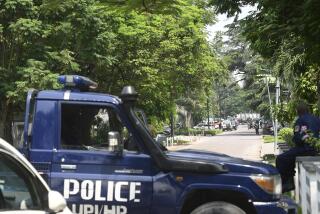Mali again in turmoil after soldiers force prime minister to resign
- Share via
Mali was thrown into turmoil again Tuesday following the arrest of Prime Minister Cheikh Modibo Diarra by soldiers who forced him to resign, an unsettling ouster that could derail plans to eject Islamic extremists from the northern stretches of the troubled country.
The prime minister appeared on state television before dawn to abruptly announce he and his entire government were resigning because the country was embroiled in crisis and “hoping for peace.” Soldiers had reportedly smashed in his door and seized him hours earlier.
Once seen as a paragon of stability in West Africa, Mali suffered a military coup in March that left the country in chaos, allowing Tuareg rebels to seize huge swaths of land in the north. Islamists piggybacked on their northern gains to impose strict religious law, stoning couples for adultery, smashing tombs in Timbuktu and chopping off hands of accused thieves.
Meanwhile, coup leader Amadou Haya Sanogo and his allies continued to steer the south. Though the military officially handed off power and Sanogo agreed to step aside, outside analysts accuse him and his allies of continuing to flex their muscles by kidnapping soldiers who opposed the coup, attacking journalists and committing other abuses.
Former military junta spokesman Bakary Mariko told Reuters and Bloomberg news services that the arrest that pushed out Diarra was not a coup, pointing out that the interim president was still in office. His forced ouster was nonetheless seen as a clear sign that the military still holds a firm grip on power, alarming outsiders who fear the army is continuing to play the spoiler to future peace.
The United Nations Security Council condemned the forced resignation and called on interim President Dioncounda Traore “to swiftly reappoint an inclusive government of national unity.” France, which has watched the gains of Islamic extremists in its former colony with fear, called on the junta to stop meddling and again urged a rapid deployment to stabilize the north.
But the ejection of Diarra could also throw a wrench into international plans to oust those militants. West African countries have pledged to send thousands of troops into the country but have struggled to get financial support and diplomatic backing from Western nations, which have questioned the soundness of plans for waging warfare in the unforgiving desert.
With Diarra under arrest, “any kind of coherent marshaling of will to aid the Malian army to reestablish peace and security in the north seems further and further away,” said Gregory Mann, an associate professor of history at Columbia University.
The arrest also thins the chances for peace talks launched in Burkina Faso to succeed, Mann said, as Tuareg rebels can simply say there is no legitimate envoy for Mali at the table.
Though Diarra stepping down came as a surprise Tuesday, experts say military forces behind the coup had recoiled at the idea of outside forces helping eject extremists from the north, arguing that Mali can do it itself with some financial support. Diarra had played a role in those negotiations and in peace talks, which some military forces had disdained, Mann said.
The prime minister, an astrophysicist who had worked for NASA and Microsoft Africa before turning to politics, also proved unpopular after choosing outsiders over local political players for his cabinet and announcing his future plans to run for president. Diarra had also failed to push forward a national dialogue with the disenfranchised north, experts say.
“The issue is not kicking the radicals out of the cities in the north. The issue is, what then?” said E.J. Hogendoorn, Africa deputy program director for the International Crisis Group.
The ejection of Diarra, while unsettling, could provide an opening for a more popular and visionary leader who could confront the longstanding imbalance in power and resources between north and south, Hogendoorn said. While the Islamist gains have set off alarms in the West, the deeper problems come down to how to govern the divided country, he said.
“The only way out for Mali is to take on those issues comprehensively and genuinely,” Hogendoorn said.
ALSO:
Eastern Congo rebels thrive on fear, chaos
U.S. blacklists Syrian rebel group for Al Qaeda ties
In Egypt, Tahrir Square awash again in revolutionary fervor
More to Read
Sign up for Essential California
The most important California stories and recommendations in your inbox every morning.
You may occasionally receive promotional content from the Los Angeles Times.










